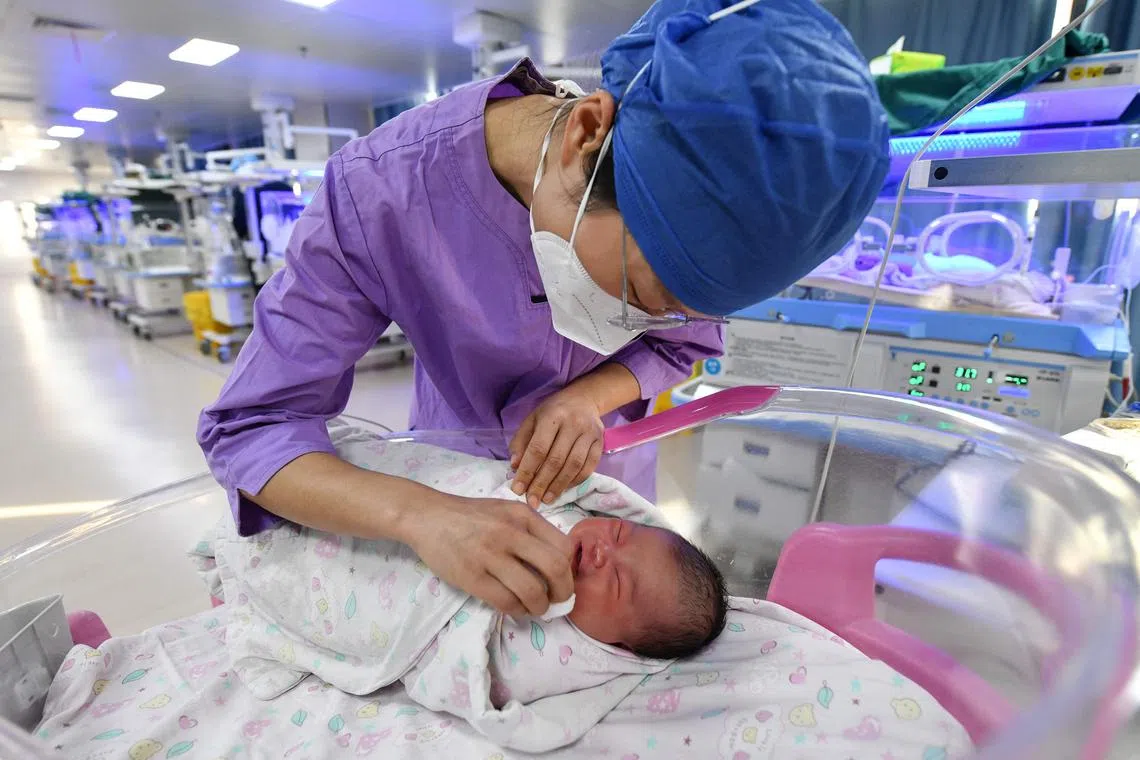China wants more babies but getting there is not going to be easy
Sign up now: Get insights on Asia's fast-moving developments

China's rapid decline in fertility rate has worried Beijing policymakers, especially after the country saw its population shrink for the first time in decades.
PHOTO: AFP
Follow topic:
BEIJING - Chongqing native Chen Qiuxia has no plans of having children. During holidays, she looks up dog-friendly domestic tours that allow her to travel with her three-year-old miniature schnauzer, Fa Cai.
“I broke up with my boyfriend last year because we couldn’t agree on the issue of childbirth. He is adamant about continuing his family line, but I cannot see myself raising a child in such an uncertain world,” said the entrepreneur, who owns a business importing speciality food.
Ms Chen, 28, is among a growing number of young Chinese who are choosing not to procreate for a variety of reasons – cost, the stressful education system and simply not feeling up to it.
Fertility rates historically decline the more developed an economy becomes as women get married and have children later.
China had a fertility rate of just 1.3 children per woman in 2020, on a par with ageing societies like Japan and Italy, and short of the roughly 2.1 needed to replace the previous generation.
The rapid decline has worried Beijing policymakers, especially after the world’s second-largest economy saw its population shrink in 2022 for the first time in decades.
At the Communist Party of China’s 20th Party Congress that year, Chinese President Xi Jinping highlighted the problem,
An endorsement from the very top meant that population concerns have been a feature of discussions at 2023’s Two Sessions, or lianghui, meetings,
A Straits Times review of such proposals made publicly available shows at least a dozen delegates putting up various suggestions, ranging from allowing women to use national insurance to pay for fertility treatments, to making it easier for children born out of wedlock to apply for the same benefits as children within marriage, and having even more school places for children of migrant workers in big cities.
Lawyer Xie Wenmin, a delegate from Hubei province, said in an interview with Beijing News that she has proposed scrapping a marriage requirement when registering a child’s birth.
“Reproductive rights should not be bundled with marriage registration. Even if women are not married, they still have the right to have children,” she said, adding that there are women who want children without being married.
Parliamentary delegate Chen Nan, who heads a food production conglomerate, suggested making housing free for those with three or more children.
Every family with a newborn should be given 5,000 yuan (S$975), while one-off maternity and yearly childcare subsidies should be offered to defray the cost of child-rearing, he said in an interview with The Paper, a Shanghai-based media outlet.
“We should also step up construction of pre-school facilities while charging low fees, which resolves the problem of who will help raise a child (if parents are working),” he said.
With education costs another pressing issue for parents, a delegate from Sichuan proposed providing free education for third children.
China in 2021 allowed married couples to have up to three children
Introduced in 1979 on fears of a population explosion, millions of women underwent forced sterilisation. Families were fined for having more than one child, and some engaged in gender-selective abortions, as boys were preferred.
It resulted in a vastly lopsided population that has been described by sociologists as “too male and too old”.
Given societal changes over the past decade, people are unlikely to suddenly want to have children because of policy changes, said Dr Zhao Litao, senior research fellow at the National University of Singapore’s East Asian Institute.
During a census in 2010, the fertility rate was 1.13, China’s lowest level ever, and in the decade since, it has increased only slightly to 1.3, he added.
“We cannot expect policies encouraging birth to immediately bear results in the short term, so another way of dealing with population decline is to look at policies at the other end – ageing,” he told ST.
Beijing-based food and beverage consultant Liu Xiaoxue, who is expecting her second child, said government policy was the least of her concerns when having a baby.
“When my husband and I found out that I was pregnant, it was at the height of the Covid-19 outbreak last autumn, and we did wonder if we wanted to bring another child into a world that is like that,” said the 38-year-old. “And then, it was about cost.
“Eventually, we decided to keep the baby since we had the means, and we are fairly liberal in how we view child-rearing, so hopefully, we don’t get caught up in the rat race like so many others.”
According to a 2019 estimate, it costs 840,000 yuan to raise a child till age 15 in Shanghai, one of China’s first-tier cities, after taking in the cost of food, education and enrichment classes.
In 2021, Beijing banned after-school classes and online tutoring
For some like tour operator Zhang Yixiu, 35, more needs to be done.
“The thought of the cost of school, enrichment classes, medical bills, it all adds up,” said the father of a nine-month-old.
“It was only after having a baby that I seriously thought of migrating because it is so much less stressful, we don’t have to compete for anything and there isn’t any societal pressure on what your child should or should not be doing.”


